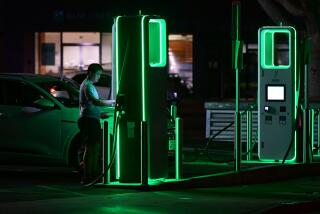A 100-mpg car? Let’s start the race
- Share via
WHAT WOULD happen if the United States were to offer a $1-billion prize for the first American automaker to sell 60,000 midsized sedans that could travel 100 miles on one gallon of gasoline?
It wouldn’t be a panacea for our energy problems, but it would stimulate the development of viable technologies to reduce oil consumption while we develop alternatives to petroleum.
There is a long history of offering prize money for important inventions. As Amory Lovins and E. Kyle Datta point out in “Winning the Oil Endgame,” the Orteig Prize for aviation, offered in 1919, was awarded to Charles Lindbergh in 1927 for his flight across the Atlantic. In fact, the 1895 Great Chicago Car Race -- which was really a test of innovation rather than speed -- played an important role in giving birth to the American automobile industry.
Competition for a prestigious prize is far more likely to get results than government programs aimed at anticipating and funding “winners.” Although occasionally effective, federal subsidies are paid before an industry proves it can achieve what it set out to do, and all too often such subsidies are given to the politically influential, not the meritorious. But prize money is paid out only when the goal is achieved.
Last month I introduced the New Options Petroleum Energy Conservation Act in Congress to establish a prize for a 100-mile-per-gallon car. To win, a vehicle would have to prove itself commercially viable and meet all federal safety standards.
Some may argue that the prize shouldn’t be offered for a car, however efficient, that runs on gasoline because the national goal should be to end our oil dependence. But it is foolhardy to insist on making the perfect the enemy of the good. Alternative fuels and new concept cars present exciting possibilities, but they probably won’t be developed quickly enough to end our petroleum dependence soon.
Meanwhile, we must conserve. And cutting gasoline consumption in the short term doesn’t conflict with the development of alternative fuel sources for the long term.
The U.S. requires 8.9 million barrels of oil a day to fuel its vehicles. Replacing our cars with prize-winning vehicles would reduce consumption to about 1.8 million barrels a day. It would also slash carbon emissions.
It is critical to the U.S. national interest to reduce our dependence on foreign oil. The growth of the Chinese and Indian economies increases global demand for oil, while the vulnerability of our supplies has been spotlighted by Venezuelan unrest, veiled Iranian threats to disrupt Persian Gulf shipping and the attempted attack on Saudi oil facilities by Al Qaeda. Our economic lifeblood must be immunized against the dictates of a global petroleum cartel. We must not allow our potential energy vulnerability to become the Achilles heel of our status as a global superpower. Our ability to pursue our interests and promote our values in the conduct of U.S. foreign policy must not be encumbered by our petroleum dependency.
The good news is that our energy, environmental and national security interests are all converging. A new coalition ranging from Greens to those concerned with the national security threat posed by our oil addiction is now possible. The challenge before us transcends traditional ideological barriers. I hope this proposal will contribute to a much-needed rethinking of our national energy policy.





